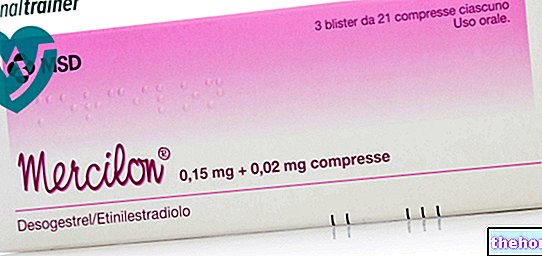Active ingredients: Misoprostol
Cytotec 200 mcg tablets
Indications Why is Cytotec used? What is it for?
Cytotec contains the active substance misoprostol which belongs to a group of medicines called prostaglandin E1 analogues. This medicine protects the lining of the stomach and intestines from substances that can cause injury.
Cytotec is indicated:
- to prevent lesions of the stomach and intestines (gastroduodenal ulcers) caused by the use of medicines used to relieve the symptoms of inflammation (non-steroidal anti-inflammatory drugs - NSAIDs);
- to treat lesions of the stomach and intestines (gastroduodenal ulcers), including when they are induced by NSAID treatment in people with severe joint disorders (osteoarthritis patients at risk) and who need to continue therapy with these medicines.
Contraindications When Cytotec should not be used
Do not take Cytotec
- if you are allergic to misoprostol, similar medicines (other prostaglandins) or any of the other ingredients of this medicine (listed in section 6);
- if you are or think you may be pregnant (or if you are planning to become pregnant) (see section "Pregnancy and breast-feeding").
Precautions for use What you need to know before taking Cytotec
Talk to your doctor or pharmacist before taking Cytotec.
Tell your doctor or pharmacist before taking this medicine if:
- suffer from disorders that can cause diarrhea, such as inflammatory bowel disease. To reduce the risk of diarrhea, Cytotec should be taken with food and should not be taken together with antacid medicines containing magnesium, used to treat certain disorders of the stomach (see sections "Other medicines and Cytotec" and "How to take Cytotec");
- have problems that can be made worse by loss of fluids (dehydration). In this case, your doctor will carefully monitor your health condition;
- suffer from severe blood circulation disorders, especially in the heart and brain (cerebrovascular disease, coronary artery disease or severe peripheral vascular disease), or from high blood pressure (hypertension), as this medicine can cause a sudden drop in blood pressure (hypotension) with worsening of the symptoms of these diseases.
Bleeding, injury or perforation of the stomach and intestines may occur during treatment with Cytotec, especially when Cytotec is taken together with other medicines used to relieve symptoms of inflammation (non-steroidal anti-inflammatory drugs - NSAIDs) (see section "Others medicines and Cytotec "). Your doctor will check you frequently.
Laboratory tests
Before starting treatment with Cytotec, your doctor will undergo specific tests (endoscopy, biopsy), to rule out that the lesions of the stomach or intestines are caused by a tumor (neoplastic lesions), as this medicine can hide the symptoms of the tumor and delay its diagnosis.
Such investigations and others deemed necessary by the doctor may be repeated at regular intervals to carry out further assessments of your state of health.
Interactions Which drugs or foods can modify the effect of Cytotec
Tell your doctor or pharmacist if you are taking, have recently taken or might take any other medicines.
Tell your doctor or pharmacist if you are taking non-steroidal anti-inflammatory drugs - NSAIDs (medicines that relieve pain and reduce inflammation). These medicines, if taken together with Cytotec, could alter the results of some laboratory tests (increased transaminases) and cause swelling due to fluid accumulation, especially in the legs and ankles (peripheral edema).
Avoid taking Cytotec together with magnesium-containing antacids (medicines used for stomach disorders), as they increase the risk of diarrhea induced by this medicine.
Warnings It is important to know that:
Pregnancy and breastfeeding
If you are pregnant or breast-feeding, think you may be pregnant or are planning to have a baby, ask your doctor or pharmacist for advice before taking this medicine.
Pregnancy
If you are or think you are pregnant you should not take Cytotec, as this medicine can cause miscarriage, premature birth and serious harm to your baby, including fetal death. If you are a woman of childbearing age, do a test to make sure you are not pregnant before starting Cytotec therapy. Start treatment with this medicine on the second or third day of your normal menstrual cycle and use effective contraception to avoid becoming pregnant during treatment. If you accidentally become pregnant, you must stop treatment with this medicine immediately (see section "Do not take Cytotec").
Feeding time
This medicine passes into breast milk. If you are breast-feeding, do not take Cytotec as it may cause diarrhea in the infant.
Driving and using machines
This medicine can cause dizziness. Therefore, avoid driving or using machines if you experience this symptom.
Cytotec contains castor oil
This medicine contains castor oil. It can cause stomach upset and diarrhea
Dose, Method and Time of Administration How to use Cytotec: Posology
Always take this medicine exactly as your doctor or pharmacist has told you. If in doubt, consult your doctor or pharmacist.
If possible, take Cytotec with meals.
Take the last dose of your medicine in the evening before going to sleep.
Avoid taking Cytotec together with magnesium-based antacids (see sections "Warnings and precautions" and "Other medicines and Cytotec").
Prevention of lesions of the stomach and intestines (gastroduodenal ulcers) caused by the use of non-steroidal anti-inflammatory drugs - NSAIDs
The recommended dose is 200 mcg, to be taken 2-4 times a day. Your doctor will determine the dose and duration of treatment that are most suitable for you, based on your health condition.
Treatment of lesions of the stomach and intestines (gastroduodenal ulcers) caused by the use of non-steroidal anti-inflammatory drugs - NSAIDs
The recommended dose is 800 mcg per day, to be taken divided into 2 or 4 doses per day. You should continue treatment for at least 4 weeks, even if your symptoms improve more quickly. If necessary, your doctor may advise you to continue the treatment for up to 8 weeks.
If you experience symptoms of an injury to your stomach or intestines, your doctor may prescribe another course of Cytotec therapy.
If you are elderly
No dose adjustments are required in the elderly.
If you have kidney problems
If you have kidney problems, your dose may need to be reduced.
Overdose What to do if you have taken an overdose of Cytotec
It is important that you do not take more medicine than prescribed. If you accidentally take very large doses of this medicine you may experience: sedation, tremors, convulsions, difficulty in breathing (dyspnoea), pain in the abdomen, contractions of the uterus muscles (uterine contractions), diarrhea, fever, increased perception of heartbeat (palpitations), low blood pressure (hypotension) or slow heartbeat (bradycardia).
If you have any further questions on the use of this medicine, ask your doctor or pharmacist.
Side Effects What are the side effects of Cytotec
Like all medicines, this medicine can cause side effects, although not everybody gets them.
See your doctor immediately if you experience any of the following side effects as they can be serious:
Undesirable effects with frequency not known (frequency cannot be estimated from the available data):
- severe allergic reactions (anaphylactic reactions)
- passage of amniotic fluid into the maternal circulation with serious damage to the mother and the fetus (amniotic embolism)
- abnormalities of uterus contractions
- fetal death during pregnancy
- incomplete delivery of the fetus and / or placenta (incomplete abortion)
- birth of the newborn before the normal period of pregnancy (premature birth)
- failure to deliver the placenta after delivery (retained placenta)
- rupture of the uterus
- perforation of the uterus
- bleeding of the uterus
- congenital malformations of the fetus (birth defects)
Tell your doctor if you experience the following side effects:
Very common side effects (may affect more than 1 in 10 people)
- diarrhea, which may in rare cases be intense and accompanied by severe dehydration;
- skin irritations (rash).
Common side effects (may affect up to 1 in 10 people)
- dizziness
- headache (headache)
- pain in the abdomen
- constipation (constipation)
- feeling of discomfort and fullness in the stomach (dyspepsia)
- flatulence
- nausea
- He retched
Uncommon side effects (may affect up to 1 in 100 people)
- bleeding from the vagina (vaginal bleeding, including postmenopausal bleeding)
- bleeding from the vagina between menstrual periods (intermenstrual)
- menstrual cycle disorders
- muscle cramps of the uterus (uterine cramps)
- fever (pyrexia)
Rare side effects (may affect up to 1 in 1000 people)
- heavy bleeding from the vagina (menorrhagia)
- intense pain during the menstrual cycle (dysmenorrhea)
Undesirable effects with frequency not known (frequency cannot be estimated from the available data)
- chills
Reporting of side effects
If you get any side effects, talk to your doctor or pharmacist. This includes any possible side effects not listed in this leaflet. You can also report side effects directly via the national reporting system at https://www.aifa.gov.it/content/segnalazioni-reazioni-avverse. By reporting side effects you can help provide more information on safety. of this medicine.
Expiry and Retention
Keep this medicine out of the sight and reach of children.
Do not use this medicine after the expiry date which is stated on the carton and blister after "EXP". The expiry date refers to the last day of that month.
Store the medicine in a dry place.
Do not throw any medicines via wastewater or household waste. Ask your pharmacist how to throw away medicines you no longer use. This will help protect the environment.
Composition and pharmaceutical form
What Cytotec contains
The active ingredient is misoprostol.
Each tablet contains 200 micrograms of misoprostol.
The other ingredients are: hypromellose, microcrystalline cellulose, sodium starch glycolate, hydrogenated castor oil.
What Cytotec looks like and contents of the pack
Cytotec tablets are available in aluminum / polyvinyl chloride blister packs of 50 tablets.
Source Package Leaflet: AIFA (Italian Medicines Agency). Content published in January 2016. The information present may not be up-to-date.
To have access to the most up-to-date version, it is advisable to access the AIFA (Italian Medicines Agency) website. Disclaimer and useful information.
01.0 NAME OF THE MEDICINAL PRODUCT
CYTOTEC 200 MCG TABLETS
02.0 QUALITATIVE AND QUANTITATIVE COMPOSITION
CYTOTEC 200 mcg tablets
Each tablet contains:
MISOPROSTOL 200 mcg
Excipient (s) with known effect: hydrogenated castor oil
For the full list of excipients, see section 6.1
03.0 PHARMACEUTICAL FORM
Tablets
04.0 CLINICAL INFORMATION
04.1 Therapeutic indications
Prevention of gastroduodenal ulcers induced by NSAIDs (non-steroidal anti-inflammatory drugs).
Therapy of gastroduodenal ulcers induced by non-steroidal anti-inflammatory drugs in arthritic patients at risk, even by continuing the administration of NSAIDs.
Duodenal and gastric ulcers.
04.2 Posology and method of administration
Prevention of NSAID-induced gastroduodenal ulcers: 200 mcg, 2 to 4 times a day.
Treatment can be continued for as long as necessary. The posology should be individualized according to the clinical condition of each patient.
Duodenal ulcers, gastric ulcers, NSAID induced peptic ulcers: 800 mcg per day, divided into 2 or 4 administrations.
Treatment should be continued for at least 4 weeks, even in the case of more rapid symptomatic improvement. In most patients, the peptic lesion heals within 4 weeks, but treatment can be continued for up to 8 weeks if necessary.
In case of ulcer recurrence, further CYTOTEC cycles can be performed.
It is advisable to take CYTOTEC with meals and to avoid magnesium-based antacids; the last administration should take place before a night's rest.
In patients with renal impairment, a reduction in dosage may be necessary.
In the elderly subject there is no need for particular modifications of the posology.
04.3 Contraindications
Misoprostol is contraindicated in the following cases:
Hypersensitivity to the active substance, to other prostaglandins, or to any of the excipients listed in section 6.1.
Women who are known or suspected to be pregnant, or who are planning to become pregnant because misoprostol increases uterine tone and contractions which can cause partial or total expulsion of the fetus (see sections 4.4, 4.6, and 4.8).
04.4 Special warnings and appropriate precautions for use
Before starting the treatment of gastric ulcer it is advisable to exclude any neoplastic lesions, since the remission of the painful symptoms determined by the drug can delay the diagnosis of this condition.
Women of childbearing potential should not initiate treatment with misoprostol until pregnancy is excluded and should be adequately informed of the importance of the use of appropriate contraceptive measures during treatment. In the event of presumed pregnancy the use of the product should be discontinued (see sections 4.3, 4.6 and 4.8).
Gastrointestinal bleeding, ulcers and perforations have occurred in patients treated with non-steroidal anti-inflammatory drugs in combination with misoprostol. Physicians and patients should consider the possibility of an ulcer occurring, even in the absence of gastrointestinal symptoms, and an endoscopy and biopsy should be performed prior to use to ensure that the upper gastrointestinal tract is not affected by malignant diseases. These investigations and others deemed necessary by the physician should be repeated at regular intervals to carry out a follow-up evaluation.
Symptomatic responses to misoprostol treatment do not exclude the presence of gastric tumors.
Misoprostol should be used with caution in patients with conditions predisposing to diarrhea, such as inflammatory bowel disease. To minimize the risk of diarrhea, misoprostol should be taken with food and the intake of magnesium-containing antacids should be avoided (see section 4.5).
Misoprostol should be used with caution in patients for whom dehydration can be dangerous. Such patients should be carefully monitored.
Clinical trial results show that misoprostol does not cause hypotension at dosages effective in promoting healing of gastroduodenal ulcers. However, misoprostol should be used with caution in the presence of disease states in which hypotension can precipitate more serious complications, for example, cerebrovascular disease, coronary artery disease or severe peripheral vascular disease, including hypertension.
Excipients:
This medicine contains hydrogenated castor oil. It can cause stomach upset and diarrhea.
04.5 Interactions with other medicinal products and other forms of interaction
Concomitant administration of NSAIDs and misoprostol may cause, in rare cases, an increase in transaminases and peripheral edema.
Misoprostol is mainly metabolised through fatty acid oxidizing systems and has not shown any negative effect on the enzymatic system of themicrosomal oxidase hepatic to function mixed (P450). In specific studies, no clinically significant pharmacokinetic interaction was demonstrated with antipyrine or diazepam. A modest increase in propranolol concentrations (mean approximately 20% of AUC and 30% of Cmax) has been observed with multiple doses of misoprostol.
Drug interaction studies between misoprostol and NSAIDs did not show clinically significant effects on the kinetics of ibuprofen, diclofenac, piroxicam, aspirin, naproxen or indomethacin.
Misoprostol does not interfere with the efficacy of NSAIDs in the treatment of symptoms of osteoarthritis and rheumatoid arthritis.
Magnesium-containing antacids should be avoided during misoprostol treatment as this combination may worsen misoprostol-induced diarrhea.
04.6 Pregnancy and lactation
Pregnancy
Misoprostol is contraindicated in pregnant women because it induces uterine contractions and can cause miscarriage, premature birth, fetal death and birth defects.
Exposure to misoprostol during the first trimester of pregnancy is associated with a significantly increased risk of incidence of two congenital malformations: Möbius sequence, namely, cranial nerve palsy (VI and VII), and terminal transverse defects of the In addition, other abnormalities, including arthrogryposis, have been reported.
Therefore the product is contraindicated during confirmed or presumed pregnancy (see section 4.3) and its use in women of childbearing age is allowed only if suitable contraceptive measures are taken at the same time. A pregnancy test should be performed in the two weeks preceding the initiation of therapy, however it should be started on the second or third day of the first normal menstrual cycle.
Cases of uterus rupture have also been reported following the use of the drug as an inducer of childbirth.
The risk of uterine rupture increases with advancing gestational age and in the case of previous uterine surgery, including cesarean delivery. The large number of parities also appears to be a risk factor for uterine rupture.
Feeding time
Misoprostol is rapidly metabolised by the mother to misoprostolic acid, which is biologically active and excreted in breast milk. Misoprostol should not be administered during breastfeeding as the excretion of misoprostolic acid in breast milk can cause undesirable effects such as diarrhea in infants.
04.7 Effects on ability to drive and use machines
Misoprostol can cause dizziness. Patients should be warned if they need to drive or use machines.
04.8 Undesirable effects
The following undesirable effects have been observed and reported during treatment with misoprostol with the following frequencies: Very common (≥1 / 10); common (≥1 / 100 to
* Cases of diarrhea and abdominal pain were dose-dependent, usually occurred early in therapy, and were self-limiting. There have also been rare reports of intense diarrhea accompanied by severe dehydration.
Clinical studies:
In clinical trials involving over 15,000 patients and healthy volunteers treated with at least one dose of misoprostol, adverse reactions observed were mainly affecting the gastrointestinal system.
Cases of diarrhea and abdominal pain were dose-dependent, usually occurring early in therapy, and were self-limiting. There have also been rare reports of intense diarrhea accompanied by severe dehydration.
The type of adverse reactions occurring with an "incidence> 1% was similar in clinical trials of short duration (lasting four to twelve weeks) and long duration (up to one year).
The overall incidence of disorders affecting the gynecological system was lower in women over the age of 50.
The safety of long-term misoprostol administration (over 12 weeks) has been demonstrated in several clinical studies in which patients were treated continuously for up to one year.
No adverse events or changes in the morphology of the gastric mucosa determined by gastric biopsy were observed.
Special populations:
No significant differences in the safety profile of misoprostol were observed in patients 65 years of age or older compared to younger patients.
The use of misoprostol in children has not yet been evaluated.
Reporting of suspected adverse reactions
Reporting of suspected adverse reactions occurring after authorization of the medicinal product is important as it allows continuous monitoring of the benefit / risk balance of the medicinal product. Healthcare professionals are asked to report any suspected adverse reactions via the national reporting system. "address: www.agenziafarmaco.gov.it/it/responsabili.
04.9 Overdose
Signs and symptoms of overdose.
The toxic dose of misoprostol in humans has not been determined. Total daily doses of 1,600 mcg were well tolerated, with gastrointestinal disturbances being the only symptom. In animals, the toxic effects are those typical of other prostaglandins: smooth muscle relaxation, difficulty respiratory, central nervous system depression.
Clinical signs attributable to overdose are: sedation, tremors, convulsions, dyspnoea, abdominal pain, uterine contractions, diarrhea, fever, palpitations, hypotension or bradycardia.
Treatment in case of overdose
Since misoprostol is metabolised as fatty acid, dialysis is unlikely to be the treatment of choice in overdose cases and is therefore not recommended. In the event of an overdose, standard supportive measures should be employed.
05.0 PHARMACOLOGICAL PROPERTIES
05.1 Pharmacodynamic properties
Pharmacotherapeutic group: Drugs for the treatment of peptic ulcer and gastroesophageal reflux disease - prostaglandins.
ATC code: A02BB01
Misoprostol is a synthetic analogue of prostaglandin E1. Misoprostol exerts a cytoprotective action on the gastrointestinal mucosa, strengthening the integrity of the mucous barrier against harmful substances, including acetylsalicylic acid, non-steroidal anti-inflammatory drugs, ethanol, bile salts. The cytoprotective action of misoprostol takes place, at least in part, through the stimulation of the normal physiological mechanisms of the gastro-duodenal mucosa, such as the secretion of bicarbonates, the production of mucus, the blood flow in the mucosa.
Misoprostol inhibits gastric acid secretion both in basal conditions and after stimulation with histamine, pentagastrin, tetragastrin, betazole, food and coffee. Furthermore, misoprostol reduces nocturnal gastric acid secretion. The gastric secretion inhibition effect occurs about 30 minutes after intake and is maintained for at least three hours.
Studies in vitro indicate that the mechanism of inhibition of gastric acid secretion is mediated by a direct action on parietal cells. Furthermore, comparative studies in animals between intravenous and intragastric administration suggest that the local effect may be predominant. Experimental and clinical studies demonstrated little or no effect of misoprostol on plasma gastrin levels.
In basal conditions and under stimulation, misoprostol reduces the secretion of pepsin, gastric acids and the volume of gastric fluid.
05.2 Pharmacokinetic properties
Misoprostol is rapidly absorbed after oral administration, with the active metabolite (misoprostol acid) reaching the plasma peak in approximately 15 minutes.
The plasma elimination half-life of misoprostol acid is 20-30 minutes. The plasma elimination half-life of the other metabolites of misoprostol is 1.5 hours.
The mean Cmax values for single dose administrations show a linear dose related relationship in the range of 200-400 mcg.
There was no evidence of accumulation of misoprostolic acid in repeated dose studies; the steady state plasma was reached in two days.
Most of the oral dose of misoprostol is excreted in the urine, as an inactive metabolite, and to a lesser extent in the faeces.
Pharmacokinetic studies conducted in patients with mild to moderate renal impairment have shown an increase in t½, Cmax and AUC values compared to the values found in patients with normal renal function.
However, there was no clear correlation between the degree of renal impairment and the AUC value. Four of the six patients considered who presented with total renal impairment were found to have a double AUC value compared to controls.
The binding of misoprostolic acid to plasma proteins is
05.3 Preclinical safety data
Misoprostol was found to be devoid of mutagenic and carcinogenic effects in numerous in vitro and in vivo tests. The product did not show teratogenic potential in tests performed on rabbits and rats treated with doses up to 1,000 mcg / kg and 10,000 mcg / kg respectively (maximum dosages to be administered in order to exclude maternal toxicity). Rabbits given 1,000 mcg / kg showed an increased incidence of embryonic mortality.
Rats administered 1,600 mcg / kg showed a reduction in fetal implants compared to the control group, although the values remained within the range expected for the breed. Loss of embryos and / or post-implantation fetuses was observed in the rat administered 10,000 mcg / kg of misoprostol.
06.0 PHARMACEUTICAL INFORMATION
06.1 Excipients
Hypromellose, microcrystalline cellulose, sodium starch glycolate, hydrogenated castor oil.
06.2 Incompatibility
Not known.
06.3 Period of validity
CYTOTEC 200 mcg tablets: 3 years
06.4 Special precautions for storage
Store in a dry place.
06.5 Nature of the immediate packaging and contents of the package
CYTOTEC 200 mcg tablets: 50 tablets
Aluminum / aluminum blisters internally lacquered by a polyvinyl chloride laminate film.
06.6 Instructions for use and handling
No special instructions.
Unused medicine and wastes derived from this medicine must be disposed of in accordance with local regulations.
07.0 MARKETING AUTHORIZATION HOLDER
CONTINENTAL PHARMA INC - Belgium
Representative in Italy:
Pfizer Italia Srl
Via Isonzo, 71 - 04100 Latina
08.0 MARKETING AUTHORIZATION NUMBER
CYTOTEC 200 mcg tablets - 50 tablets - A.I.C. 026488015
09.0 DATE OF FIRST AUTHORIZATION OR RENEWAL OF THE AUTHORIZATION
Date of first authorization:
CYTOTEC 200 mcg tablets - 50 tablets: September 26, 1988
Latest renewal date:
CYTOTEC 200 mcg tablets - 50 tablets: May 31, 2010
10.0 DATE OF REVISION OF THE TEXT
07 July 2015




























